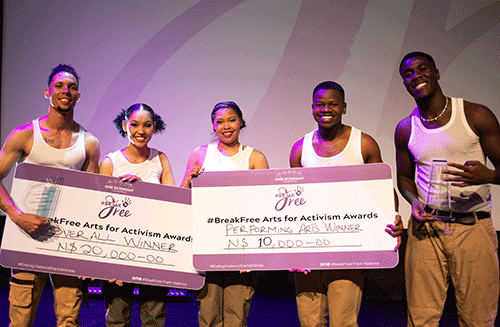Headed by young Namibians, the #BreakFree movement started 16 days of activism last week Thursday, with their third annual Arts for Activism Show at the National Theatre of Namibia in Windhoek.
Gender and child protection specialist Veronica Theron said Namibia has high rates of violence, including an increased number of gender-based violence cases and survivors, while perpetrators are getting younger.
“During 16 days of activism, we have heightened awareness-raising efforts. But for the last eight to nine years, we, in the Office of the First Lady, have 365 days of activism through case management, victim support services, capacity building and the training of frontline service providers, research and thought leadership,” she stated. Said Theron: “Respondents in our recent research conducted in four regions and correctional facilities all cry for tangible change: change in mindsets, change in harmful cultural beliefs and traditional practices which perpetuate violence, change in low conviction rates and long delays and postponements in GBV cases, and strengthened coordination in the prevention and response to GBV cases. Young people want to see accountability and action.”
One Economy Foundation CEO Uajorokisa Akwenye said partnerships with the UNFPA, Namibia Correctional Service, Nampol’s GBV units and the City Police Victim Support Unit are all vital.
She expressed gratitude to the panel of judges, the survivors and ex-offenders who attended, as well as the contestants for their diverse and impactful acts and pieces of art.
“#Breakfree and #BeFree, with partners, will continue with a series of activities in commemoration of 16 Days of Activism until 10 December 2023, including the commemoration of World AIDS Day on 1 December and International Day for People Living with Disabilities on 3 December 2023,” she noted.
This event featured 19 individuals aged 15 to 35 from across the country who performed acts and displayed their talents across four artistic categories, namely visual arts, performing arts, fashion design and multimedia. Each category winner received N$10 000 while the grand prize winner received an additional
N$20 000, totaling N$30 000.
Last year, acrobatic dancer Le-Clue Job won the overall prize and the performing arts section at #BreakFree ‘Arts for Activism’ show.
The inability to verbally express his battles when hurting has led Job to do acrobatic dancing to deal with his emotions, and control how he reacts to circumstances around him since he is a non-confrontational person.
First Lady Monica Geingos has repeatedly stated that the arts industry in Namibia is not as properly supported as it should be, adding that there are a lot of young people from across the country who are struggling with unemployment, although they possess certain skills.
“If we want to deploy these creative skills they have, we must make the art sector a viable economic sector for young people to participate,” she added.
– psiririka@nepc.com.na



